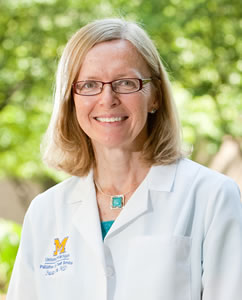Make Yourself Comfortable

Addressing symptoms of cancer treatment to feel better
Cancer patients see a wide range of caregivers, from oncologists to surgeons, radiologists to anesthesiologists. Each plays a role in the treatment process to help patients have the best quality of life possible.
So which person on your care team is the one to talk to about tingling pain in your feet? What about nausea? Or maybe you’re so full of anxiety at night that you can’t sleep. Who is the best caregiver to go to for that?
The easy answer, says Susan Urba, M.D., is someone on your primary oncology team. Cancer and its treatment comes with symptoms and side effects. Most patients experience them at one point, some minor and others intolerable. Every caregiver at the Rogel Cancer Center -- from front-line staff at check in to nurses taking your vital signs to the technician giving your chemotherapy -- is concerned about how you’re feeling and can get you to the right person for help.
Symptoms and side effects often need added care and attention. We sat down with Urba, who directs the Symptom Management and Supportive Care Program. She discusses the variety of issues patients might face and what resources are available.

Q. What are some examples of symptoms and side effects that patients need help with?
One of the most common symptoms we see is pain. It might be neuropathic pain, burning in the hands and feet, that often results from chemo. Some pain comes from the cancer itself. There are numerous types of pain medicines to get the best treatment. There are nerve blocks and physical interventions for their pain. We have an anesthesia pain doctor come to our clinic six times per month. We also partner with a Physical Medicine and Rehabilitation physician who visits our clinic twice a week to develop programs for patients who may benefit from physical modalities to help their pain.
Another common issue patients need help with is nausea. Though patients take anti-nausea medication with chemotherapy, some still struggle. We take it a step further by adding other medications and approaches to help control that symptom. Dietitians in our clinic help counsel patients on what to eat or not to eat during periods of nausea or diarrhea.
Q. What about the importance of emotional support?
Cancer comes with psychological struggles. People might need help dealing with stress or issues of faith. We frequently call our chaplain to offer spiritual support. We have a clinical social worker who offers psychological support, practical assistance, meditation, visualization and relaxation techniques. We interact with the art therapist and music therapist. These support services are available to all patients.
For patients struggling with serious psychological issues like depression, the PsychOncology Program has psychiatric health providers who specialize in treating patients with cancer.
Q. Why offer a separate clinic for symptom management?
We want to support patients in many ways. Sometimes, depending on their situation with cancer, patients may have several doctors, like a radiologist, an oncologist and surgeon. It can be confusing who is steering the ship. We try to help advocate for good communication between the patient and his or her many health providers.
Our clinic is a part of the cancer care team that can provide an extra layer of support and intervention to improve the patient’s quality of life. Any clinician on your care team can refer you here for an appointment. You can also self-refer. Generally speaking, we see patients for what we call high-burden symptoms. Often we can begin to help manage them within a week to 10 days.
Q. What is an appointment like at the Symptom Management and Supportive Care Clinic?
Types of caregivers you’ll find in the Symptom Management and Supportive Care Program:
- Anesthesiologist
- Art therapist
- Chaplain
- Clinical social worker
- Dietitian
- Medical assistant
- Medical oncologist
- Music therapist
- Nurse practitioner
- Pharmacist
- Physical Medicine and Rehabilitation physician
- Scheduler
We want to make each patient feel like an individual in our large system. Our appointments are often longer than standard clinics because we know it takes time to manage some of these difficult symptoms. We have tried to make the clinic's environment as relaxing and comforting as possible, and coordinate with as many teams as possible to get them the support they need.
We always try to coordinate visits when the patient is here for another appointment. The patient can get numerous services in one visit that are harder to orchestrate separately. If someone comes from a distance for treatment, we aim to coordinate appointments around that.
A patient will either see a nurse practitioner or me, the physician, so we can assess what’s going on. Then we’ll coordinate with whatever other services are needed. It could be a nutritionist, pain management specialist, a social worker or psychiatric health provider.
Q. Is this palliative care? Is it only for patients near the end of life?
Palliative care, broadly, means trying to provide relief of suffering. Patients might need help managing symptoms at all stages of their disease, starting from the time of diagnosis and at various points throughout their care. Yes, we treat end-of-life patients. They are an important sub-set of the patients in our clinic.
We are a supportive care team for all patients at the cancer center.
Read the Spring, 2016 issue of Thrive
Editor's note: Susan Urba, M.D. has retired from the U-M Rogel Cancer Center. The cancer center continues to offer a symptom management clinic.
Learn more about Symptom Management and Supportive Care Program
Make an Appointment: 877-907-0859
Visit the Symptom Management and Supportive Care Program webpages
Get information about cancer treatment and side effects:
